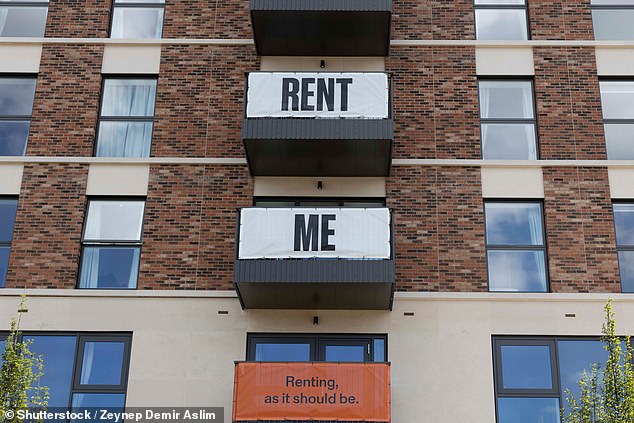My partner and I have just sold our flat and are looking for somewhere to buy. We are currently staying with family but are keen to regain our independence even if it ends up costing us.
We were looking for properties to buy in the area we are looking to move to, but nothing materialised in the time we were selling. We decided to move out rather than delay our own sale.
Local estate agents told us there was the usual summer lull in new listings, but this hasn’t really changed in September with sellers seemingly putting plans on hold until after the budget on 26 November.
With that in mind, we are thinking about renting in the interim while we look. The rents we would be looking at are around £2,500 per month.
We have £400,000 in savings earning 4 per cent thanks to the sale of our flat, but are worried about eating into that over the next year by renting, which could weaken our buying position.

Quandary: We’ve sold our home… but cannot find a suitable property to buy
As higher rate taxpayers I believe we will also be taxed at 40 per cent on the savings interest – and we can’t of course deduct the rent from our tax bill.
Do you have any advice on how to make our savings work harder over the next six to 12 months so we don’t lose out by renting.
Obviously investing in the markets would be too risky but someone said we should consider gilts, but we are worried that could also cost us if we suddenly come across the perfect home. And also what tips do you have for negotiating the best possible rental deal?
Ed Magnus of This is Money replies: First, well done for picking up a 4 per cent savings rate. If that’s an easy-access account, then you’re getting one of the best returns currently available.
You are right to consider the tax implications that come with keeping your money in ordinary savings accounts.
Higher rate taxpayers only get a £500 tax free savings allowance each year on any interest they earn. If both of you are higher rate taxpayers you can both make use of your allowances and make that £1,000 combined.
You could further reduce your tax burden by each making full use of your £20,000 annual Isa allowances.
However, gilts could be a tax efficient way of saving the remaining amount, albeit they are not without some risk.
Gilts are UK government bonds issued by HM Treasury. They are essentially government IOUs which the government issues when it needs to raise money. Investors then buy and trade them.
Gilts are deemed as one of the safest investments given the government is unlikely to default on its debts as it can always print more money.
Gilt prices fluctuate from day-to-day in the market, depending on the outlook for interest rates.
The majority of gilts pay a fixed coupon and mature at a set date, which can vary from a few months to over 40 years. In your case it’s probably best to go for one maturing next year.
But because gilt prices change in value all the time, that means there is investment risk attached, and you need to be comfortable with that and do your research first.
Under current tax legislation, tax is paid on the interest payment of gilts, but any rise in capital value as and when these bonds redeem is free of either capital gains tax or income tax.
Your decision to rent is by no means a bad one if it suits your circumstances – it’s not a decision not to be taken lightly, especially if you have young children.
After all, even if you find somewhere to buy this year or early next year, it will likely take months to legally complete anyway.
And with the Renters Rights Bill coming into force soon, you may even be able to escape your tenancy early, albeit with two months notice.
Some estate agents are saying it’s a buyers market, with bargains to be had at every turn – at least for those brave enough to transact.
But if people continue to put their plans on hold and homes stop hitting the market, it becomes more like a dead market, with choice severely limited, which sounds a bit like what you’re seeing at the moment.
Rumours of taxes to be announced in the upcoming budget have been rife of late with paranoia spreading across the country leaving the property market all but frozen in fear.
Rightmove figures showed that new listings were 7 per cent down in August compared to last year.
Compared to August 2021, at the height of the pandemic induced property boom, new listings in August this year are down almost 41 per cent.
So renting and waiting for the market to pick up again may work in your favour.
For expert advice, we spoke to Sarah Coles, head of personal finance at investing platform Hargreaves Lansdown and Joe Akik, wealth manager at St. James’s Place partner practice, Capital Planning Partners.

Sold up: Our reader has sold their home but isn’t seeing much come up where they are looking to buy
Should they keep their money in savings?
Sarah Coles replies: In accessibility terms, it means you need an easy access savings product, so you can get your hands on it when you need it.
In tax terms, you can each put £20,000 into a cash Isa, but if you put the rest into savings accounts, there would be tax to pay on any interest over £500 a year each, so a total of just over £13,500.
You would also need to take care not to hold more than £85,000 with each institution, so it was protected if anything went awry.
You are usually covered for more under short-term temporary rules, but this would expire well before a year was up.
It is much easier to split your money and manage it using a cash savings platform.
Otherwise, you could consider saving with NS&I where all your savings are guaranteed by the Treasury.
Joe Akik adds: You can earn more on your cash, but you’ll sacrifice flexibility. That’s the reality of short-term money.
Inflation is running at 3.8 per cent, so £400,000 sitting in cash is already losing value.
As higher rate taxpayers you only get £500 of savings interest tax-free, with the rest taxed at 40 per cent. Even at 4 per cent savings rates, much of that benefit disappears once tax is deducted.

Sarah Coles, head of personal finance at investment platform Hargreaves Lansdown
Should they use gilts instead?
Joe Akik replies: Short-dated gilts could help. They’re loans to the government and, if held to maturity, you know exactly what you’ll get back.
A one-year gilt currently yields around 3.7 per cent, which looks lower than the best savings accounts at first glance. But the structure matters. Gilt coupon income is taxable, but capital gains are not.
Many short-dated gilts are issued at a discount and redeemed at par, so much of the return is delivered as a tax-free gain.
That can make them more efficient than savings for higher-rate taxpayers, even with a lower headline yield.
The drawback is that efficiency only holds if you wait until maturity, so if you sell early because the perfect property appears, you could get back less than you put in.
That’s why I’d split the money. Keep some in easy-access savings for flexibility, and use gilts for the portion you know you won’t need immediately. Premium Bonds can also add tax-free upside without tying you in.

Joe Akik , wealth manager at St. James’s Place partner practice, Capital Planning Partners
Sarah Coles adds: Given your time frame, your priorities are security and accessibility of the cash.
The need for security over the short-term rules out investing and, as a result, it rules out gilts too.
Gilts are effectively where investors lend money to the UK government in return for monthly interest payments.
They’re popular partly because they’re relatively low risk if you are prepared to hold them to maturity and there’s no capital gains tax on gains.
However, if you may need the money at any time, you can’t be certain to hold them to maturity, and so the risk rises.
Prices will rise and fall depending on demand and supply, so if you choose to buy a gilt and then sell it before it matures you could get back less than you invest.
Should they rent before they buy?
Sarah Coles replies: Negotiating a rental deal is incredibly difficult at the moment because the dearth of properties to rent means there are multiple tenants competing for each one.
You may also struggle to rent anywhere for less than 12 months if a landlord is keen on a longer let.
It comes down to what price you are prepared to pay for your independence today.
Financially, you would be better off trying to speak to your family and discuss ways of living together that work for you all over the next 6-12 months, but only you will know whether this would work in reality.
Joe Akik adds: Financial planning should support your life, not restrict it. Renting for a year and drawing on savings isn’t failure if you value your independence, it’s an investment in quality of life.
How to secure a rental home in a red hot market?
Ed Magnus of This is Money replies: Unlike home buyers, renters are having to compete fiercely for properties.
It’s therefore vital you do everything possible to make yourselves stand out from the crowd.
Building relationships with letting agents or offering to pay more are the obvious tactics, but there are a number of other things renters can do to show they are an attractive prospect for a landlord.
Having references, deposit funds, paperwork and proof of income ready to go is one way you can stand out from the competition.
Also be clear about when you can move in. If you can show you are able to move in when they need and are prepared to move out when they want, that will stand you in good stead.

Challenging: Unlike the sales market, renters face stiff competition when bidding on rental properties
Don’t worry about getting locked into long-term term fixed tenancies either. The Renters’ Rights Bill will put an end to fixed-term tenancies with all rental agreements converting into rolling periodic ones.
This means a landlord can’t tie a tenant into a 12-month or two-year contract where you are obliged to pay rent for the whole period, even if you leave.
Instead, all tenancies will be rolling, meaning you can leave at any time provided you give the required notice of two months.
It will apply retrospectively, so that even if someone is in the middle of a two or three-year rental agreement without a break clause, they should be able to serve two months’ notice and leave once the Renters’ Rights Bill comes into force.
While the Bill has not yet become law, it is expected to receive Royal Assent imminently.
Adding a personal touch to applications can also tip the landlord in a tenant’s favour. Not the full life story but a glimpse into who you are, your interests and why you’re moving to the area.
This could help create a sense of personality which will make you stand out from the other faceless applications.
When it comes to offering in a hot market where rents are on the rise, beginning with a low offer or attempting to negotiate down isn’t advisable either.
You often won’t get the chance to bid again, so set a budget, stick to it, and start with your best offer.
